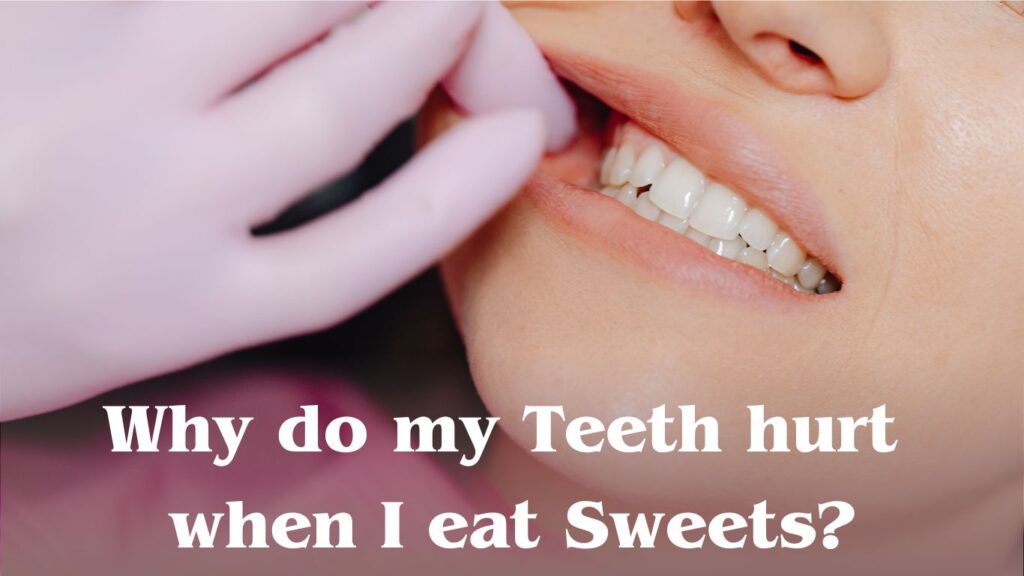We are no dentist, but we can offer some general explanations for why your teeth may hurt when you eat sweets. There are several potential reasons for this discomfort, some of them are detailed below. These explanations might help you find an answer to your question why do my teeth hurt when I eat sweets.

Potential reasons for: why do my teeth hurt when I eat sweets?
Tooth Sensitivity: Tooth sensitivity occurs when the protective layer of enamel on your teeth wears down or becomes damaged, exposing the sensitive dentin underneath. Sweets, especially those that are very sugary or acidic, can trigger a painful sensation when they come into contact with the exposed dentin, leading to discomfort.
Cavities: Consuming sugary foods and drinks can contribute to the formation of cavities. Bacteria in the mouth feed on sugar, producing acid as a byproduct. The acid can erode tooth enamel and create cavities, which are holes or pits in the teeth. When you eat sweets and the sugar gets trapped in these cavities, it can irritate the nerves inside the tooth, causing pain.
Gum recession: If your gums recede, the root surfaces of your teeth may become exposed. Unlike enamel, the root surfaces do not have a protective layer and are more sensitive to temperature and sweets.
Cracked or fractured teeth: If you have cracked or fractured teeth, eating sweets can put pressure on the damaged area and cause pain.
Bruxism: Grinding or clenching your teeth (bruxism) can lead to tooth sensitivity and discomfort. Consuming sweets may exacerbate this sensitivity if you grind your teeth while eating.
Dental procedures: If you’ve recently had dental work, such as fillings or crowns, your teeth may be temporarily sensitive to sweets until they fully settle.
It’s important to note that tooth pain when eating sweets could be a sign of an underlying dental issue. If the pain persists or worsens, it’s crucial to schedule a visit with your dentist. They can properly examine your teeth, identify the cause of the pain, and recommend the appropriate treatment.
To prevent tooth pain from sweets and maintain good oral health, consider the following tips:
– Make sure to brush your teeth with fluoride toothpaste at least two times daily.
– Floss daily to remove food particles and plaque between your teeth.
– Reduce the consumption of foods and beverages that are high in sugar and acidity.
– Use a soft-bristled toothbrush and avoid brushing too hard, as aggressive brushing can damage enamel and gums.
– Use toothpaste specially designed for sensitive teeth if you’re experiencing sensitivity.
– Schedule regular dental check-ups to catch and address any dental issues early on.
Remember, personalized advice from a dentist is essential for proper diagnosis and treatment of any dental concerns you may have.
Some FAQs
Here are some frequently asked questions (FAQs) related to limiting the intake of sugary and acidic foods and drinks
Why should I limit my consumption of sugary and acidic foods and drinks?
Limiting your intake of sugary and acidic foods and drinks is crucial for maintaining good oral health. Excessive sugar consumption can lead to tooth decay, while acidic foods can erode tooth enamel, increasing the risk of cavities and tooth sensitivity.
What are some examples of sugary and acidic foods and beverages to avoid?
Examples of sugary and acidic foods and beverages to avoid include soda, fruit juices, candies, cookies, cakes, and sports drinks. These items are high in sugar and can be detrimental to your teeth.
Can reducing sugary and acidic food intake help prevent cavities and tooth sensitivity?
Yes, reducing your consumption of sugary and acidic foods can significantly help prevent cavities and reduce tooth sensitivity. By limiting exposure to harmful acids and sugars, you protect your teeth from potential damage.
Are there any alternative sweeteners or healthier drink options to replace sugary beverages?
Yes, there are alternatives to replace sugary beverages. You can use natural sweeteners like stevia or xylitol in moderation. Healthier drink options include water, herbal teas, and unsweetened beverages.
Should I be concerned about hidden sugars in processed foods and snacks?
Yes, hidden sugars in processed foods and snacks can contribute to your daily sugar intake and impact your dental health. It’s essential to read food labels and be mindful of added sugars in these products to make informed choices.
Remember, maintaining a balanced diet, practicing good oral hygiene, and seeking advice from dental professionals are essential for promoting overall oral health and preventing dental issues.
For more informative articles, please check DailyPostman!
